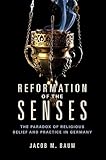Reformation of the senses : the paradox of religious belief and practice in Germany / Jacob M. Baum.
Material type: TextSeries: Studies in sensory historyPublisher: Urbana : University of Illinois Press, [2019]Description: 1 online resourceContent type:
TextSeries: Studies in sensory historyPublisher: Urbana : University of Illinois Press, [2019]Description: 1 online resourceContent type: - text
- computer
- online resource
- 9780252050930
- 0252050932
- Senses and sensation -- Religious aspects -- Christianity -- History
- Senses and sensation -- Germany -- History
- Reformation -- Germany
- Germany -- Church history
- Sens et sensations -- Aspect religieux -- Christianisme -- Histoire
- Sens et sensations -- Allemagne -- Histoire
- Allemagne -- Histoire religieuse
- RELIGION -- Christianity -- History
- HISTORY -- General
- Reformation
- Senses and sensation
- Senses and sensation -- Religious aspects -- Christianity
- Germany
- 274.3/06 23
- BT741.3
| Item type | Home library | Collection | Call number | Materials specified | Status | Date due | Barcode | |
|---|---|---|---|---|---|---|---|---|
 Electronic-Books
Electronic-Books
|
OPJGU Sonepat- Campus | E-Books EBSCO | Available |
Includes bibliographical references (pages [271]-288) and index.
"Through careful examination of religious beliefs and practices in the German-speaking world from approximately 1400 to 1600, this book challenges the centuries old narrative of the transition from late medieval Christianity to Protestantism as a process of 'de-sensualizing' religion. The common assumption that Protestant Christianity is somehow more intellectual and less sensual than its late medieval and Catholic counterparts has its origins in the culture of the German evangelical movements of the early sixteenth century, and continues to influence how we think and talk about religious difference generally to this day. This study develops a critique of this narrative in two parts, integrating periods of late medieval and early modern history, often treated as distinct fields of study. In part one of the study, critical scrutiny of the practical provisioning for sensuous worship and discussions about its meaning in the church of the fifteenth and early sixteenth centuries reveals that late medieval religion was a far more complex, locally variegated, and dynamic thing than scholarly and popular narratives of the 'sensuous' Middle Ages often assume. Part two turns to the early Protestant Reformation's relationship to the late medieval paradigm. It shows that popular discourse framed the early Reformation as inaugurating a fundamental break with the world that came before it. Despite this, considerable continuities in belief and practice persisted, particularly in the Lutheran tradition, but also, significantly, among reformed traditions often perceived as representing a more definitively modern, and correspondingly less sensuous, form of Christianity"-- Provided by publisher.
Late Medieval worship : a sensory production -- The senses and sacramentality in late Medieval intellectual discourse -- The senses and religious experience in vernacular theology -- The reformation of the senses in early evangelical culture -- Implementing the reformation of the senses in practice -- Thinking with the senses in the Second Reformation.
Description based on print version record.
eBooks on EBSCOhost EBSCO eBook Subscription Academic Collection - Worldwide
There are no comments on this title.

